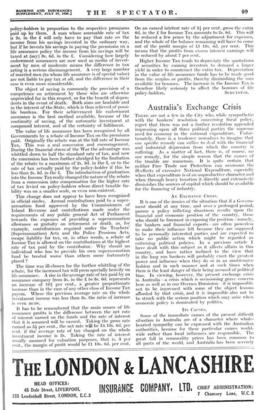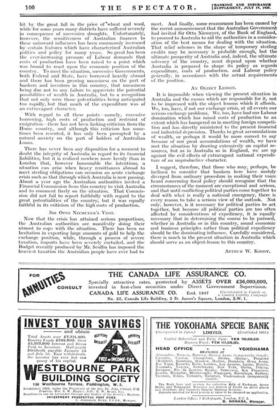Australia's Exchange Crisis
THERE are not a few in the City who, while sympathetic with the bankers' resolution concerning fiscal policy, - regret that there was not a further resolution appended, impressing upon all three political parties the supreme need for economy in the national expenditure. Unfor- tunately, there is a tendency nowadays to imagine that: one specific remedy can suffice to deal with the financial and industrial depression from which the country is suffering. As a matter of fact, there is, of course, no one remedy, for the simple reason that the causes of the trouble are numerous. It is quite certain that neither Free Trade nor Protection can overcome the ill-effects of excessive National Expenditure, especially when that expenditure is of an unprod net ive character awl. when through heavy taxation it direct ly and extensively- diminishes the sources of capital which should be availabfe- for the financing of industry.
AN EXCHANGE CRISIS.
It is one. of the ironies of the situation that if a Govern-. ment should at any time, and over a prolonged period,. pursue a policy inflicting disastrous results upon the financial and economic position of the country, those who should be foremost in exposing the position—namely, the bankers and financial experts —are often powerless to make their influence felt because they are supposed to be personally interested. parties- and arc expected to take no public action which might be regarded as criticizing political policies. In a previous ankle I have dealt with this subject as it affects affairs in this country, and have rather inclined to the view that in the long run bankers will probably exert the greatest power and influence when they do so in an unobtrusive fashion and in such manner and at such times when there is the least danger of their being accused of political bias. In viewing, however, the present exchange crisis in Australia—a crisis which is occasioning grave concern here as well as in our Oversca Dominion—it is impossible not to be impressed with sonic of the object lessons afforded by that crisis, and it is impossible also not to be struck with the serious position which may arise when economic policy is dominated by polities.
ITS CAUSES.
Some of the immediate causes of the present difficult situation in Australia are of a character where whole- hearted sympathy can be expressed with the Australian authorities, because for these particular causes world- wide rather than local influences are responsible. The great fall in commodity prices has been common to all parts of the world, and Australia has been severely
hit by the great fall in the price of 'wheat and wool, while for some years many districts have suffered severely in consequence of successive droughts. Unfortunately, however, the sensitiveness of Australian finances to these untoward influences has been enormously increased by certain features which have characterized Australian politics and policy for many years. So great has been the ever-increasing pressure of Labour demands that costs of production have been raised to a point which- was bound to react upon the economic position of the country. To meet the situation, successive Governments, both Federal and State, have borrowed heavily abroad and there has been growing uneasiness on the part of bankers and investors in this country, that Uneasiness being due not to any failure to appreciate the potential possibilities of wealth in Australia, but to a recognition that not only were those potentialities being anticipated too rapidly, but that much of the expenditure was of an extravagant character.
With regard to all these points—namely, excessive borrowing, high costs of production and restraint of emigration—there has not been lacking criticism from the flomc country, and although this criticism has some- times been resented, it has only been prompted by a natural anxiety on the part of holders of Australian Loans.
There has never been any disposition for a moment to doubt the integrity of Australia in regard to its financial liabilities, but it is realized nowhere more keenly than in London that, however honourable the intentions, a situation can arise when heavy remittances abroad to meet sterling obligations can occasion an acute exchange crisis such as that through which Australia is now passing. About a year ago the Australian authorities invited a Financial Commission from this country to visit Australia and to comment freely on the situation. That Commis- sion did not fail to report faithfully with regard to the great potentialities of the country, but it was equally faithful in its criticism of the high costs of production.
SIR OTTO NIEMEYER'S VISIT.
Now that the crisis has attained serious proportions, the Australian authorities are manifestly doing their utmost to cope with the situation. There has been no hesitation in exporting large amounts of gold to help the exchange position, while, through a process of severe taxation, imports have been severely curtailed, and the Budget recently produced by Mr. Scullin has imposed the heaviest taxation the Australian people have ever had to meet. And finally, some reassurance has been caused by the recent announcement that the Australian Government had invited Sir Otto Niemeyer, of the Bank of England, to proceed to Australia to aid the authorities in a consider- ation of the best means for dealing with the situation. That relief schemes in the shape of temporary sterling credits may be necessary is probable enough, but the ultimate prosperity of Australia and, indeed, the ultimate solvency of the country, must depend upon whether Australia is prepared to shape its policy as regards expenditure, costs of production, and Labour policy generally, in accordance with the actual requirements of the position.
AN OBJECT LESSON.
It is impossible when viewing the present situation in Australia and the causes which are responsible for it, not to be impressed with the object lessons which it affords. We, too, have, if not our exchange crisis, at all events our serious exchange problems. We, too, have had our Labour domination which has raised costs of production to an extent which has hampered us in meeting foreign competi- tion and has directly ministered to the present financial and industrial depression. Thanks to great accumulations of wealth, or perhaps it would be more correct to say because of our great accumulations of wealth, we have met the situation by drawing extensively on capital re- sources, but as in Australia so in England, we are up against the evil effects of extravagant national expendi- ture of an unproductive character.
I suggest, therefore, that those who may, perhaps,- be inclined to consider that bankers here have unduly diverged from ordinary procedure in making their voice heard concerning fiscal policy should recognize that the circumstances of the moment are exceptional and serious, and that until conflicting political parties come together to deal with what is really a national emergency, there is every reason to take a serious view of the outlook. Not only, however, is it necessary for political parties to act together, but because all political parties are too often affected by considerations of expediency, it is equally necessary that in determining the course to be pursued, whether in Australia or in this country, sound economic and business principles rather than political expediency should be the dominating influence. Carefully considered, there is much in the present situation in Australia which should serve as an object-lesson to this country.
ARTHUR W. KIDDY.

















































 Previous page
Previous page